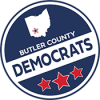Party members and the general public frequently ask why the Butler County Democratic Party (BCDP) isn’t doing something regarding a particular issue or event. We’re often told that Indivisible, MoveOn.Org, Ohioans for Gun Safety, or some other interest group is organizing a rally, a protest, a sit-in, a teach-in, or a petition drive. So why doesn’t the BCDP do the same? The answer to this question simply boils down to the differences in mission between a political party and a special interest group.
Political parties and interest groups are organizations that act as intermediaries between the population and the political sphere. Parties and groups bring together people with similar ideas and visions on specific or broader issues, including economics, immigration, taxes, public assistance, healthcare, environmental protection, gun violence prevention, and so on. Although political parties and interest groups have different missions, they are both means through which citizens can deepen their knowledge of political and social issues and can become informed voters.
Similarities & Differences
In general terms, political parties have as their primary function to recruit candidates who support their core values and win elections. In order to maximize their chances of winning elections, political parties aim at achieving the support of the majority of their population and consequently focus on a broad variety of different issues (i.e. education, taxes, immigration, etc.). It is important to note that not all members of political parties have the same views on every issue. At times, political parties such as the Butler County Democratic Party will sponsor information sessions, issue calls to action, and pass resolutions to influence public policy. Often these actions are done in order to demonstrate the need to elect a certain candidate who will implement the party’s core values in the political sphere or to contrast our candidate’s platform with that of the opposition candidate.
Conversely, special interest groups do not participate directly in the electoral process but are deeply involved in lobbying and actively trying to influence the makers of public policy. Interest groups usually focus on a single issue (i.e. gun violence prevention or environmental protection) and promote their ideas by uniting like-minded people. Interest groups will occasionally endorse candidates who support their policies, but generally they are nonpartisan organizations and therefore not affiliated with a particular political party.
Cooperative Solution
What this boils down to is that if people wish to get deeply involved with a specific issue, they should find a special interest group that promotes that issue. When they are ready to support a candidate who supports their issue, they should work with the party.
Both the BCDP and area special interest groups are limited by volunteers and financial resources. Thus, we should not attempt to duplicate what the other does. The BCDP depends on special interest groups to influence policymakers. Likewise, special interest groups can depend on the BCDP to maintain the infrastructure that allows us to concentrate on recruiting and electing progressive candidates in Butler County.
The Butler County Democratic Party encourages its members to get involved with local special interest groups in addition to supporting the party’s goals and activities. Through cooperation we can work together for a better Butler County.

